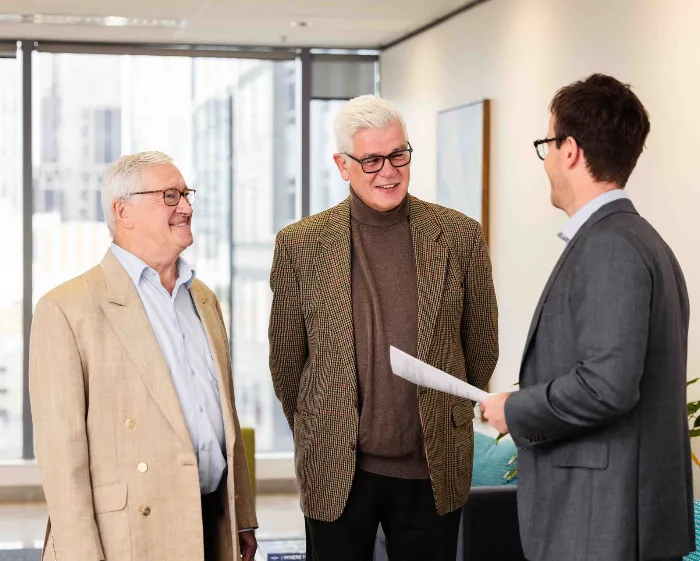Capital gains tax is often feared, but with proper planning, it can support stronger financial outcomes in retirement.
8 August, 2025
Why you shouldn’t be afraid of paying capital gains tax
First Financial Team

Too many investors hesitate at the very moment they should be stepping forward. It’s common to instinctively want to avoid triggering capital gains tax (CGT), but you really shouldn’t be afraid of paying it. Clinging to assets can hold you back from better financial outcomes. With the right planning, CGT can be the gateway to more flexible, effective wealth strategies, especially in retirement.
At First Financial, we work closely with clients to develop personalised financial plans that reflect their full circumstances. When it comes to capital gains tax events, timing is critical. Many people hesitate to sell because they’re petrified of the cost, but you can’t let CGT hold you back from living the life you’ve worked hard to build.
Why capital gains tax gets a bad rap
For most people, the mere mention of tax is enough to make them recoil. That response is entirely understandable. If you’ve built an investment portfolio over time, the idea of handing over a chunk of your profits to the ATO feels like giving something up. But this reaction is emotional, not rational, because what’s left can still help you do something meaningful, such as improving your financial position or affording the retirement you’re aspiring to.
A common mistake is thinking CGT is fixed and unavoidable in full. The reality is, there are established strategies that can reduce the amount payable. For example, holding an asset for more than 12 months makes you eligible for the 50% CGT discount. Selling in a low-income year means the gain is taxed at a lower marginal rate. Using concessional super contributions before age 67 can reduce the tax further. These are not loopholes or tricks. They’re standard, legislated options that exist to support long-term investing and retirement planning.
From slight hesitation to full financial paralysis, some investors get stuck on CGT, even when they know the numbers. They keep properties that generate limited income and avoid accessing capital that could be used more productively. When fear is driving the decision, logic and long-term lifestyle planning are pushed aside.
Why CGT is actually one of the ‘better’ taxes
As mentioned earlier, if you’ve owned an asset for more than 12 months, you’re entitled to a 50% reduction on the capital gain before tax is applied. For investors who have held shares, property or other assets over time, this concession can significantly reduce the final tax bill and leave more in their pocket than they may have expected.
Unlike other forms of ongoing tax, capital gains tax only applies when you sell an asset. You won’t be taxed just for holding it. That gives you control to time the sale around your broader financial planning decisions.
Since CGT is calculated based on the income you receive in the financial year of sale, the overall tax impact depends on your broader situation at that point in time. If you’re no longer working, for instance, the gain may fall into a lower tax bracket than it would have during your peak earning years. Combined with other planning tools, like deductible super contributions, this can result in a much more manageable outcome.

Strategic selling always beats holding assets indefinitely
Some assets serve a clear purpose in the wealth-building phase, but that doesn’t mean they should be held forever. On paper, property often seems like a strong asset, but for many nearing retirement, it’s a little more complicated. Once you factor in land tax, council rates, insurance, maintenance and vacancy periods, the actual income can be underwhelming. This is especially true in places like Victoria, where land tax can significantly reduce overall returns. Properties that carry debt or were never designed for yield often fall short of supporting a reliable retirement income.
When rental income doesn’t cover your costs in retirement, it’s common to start drawing more heavily on super to make up the shortfall. That can quickly reduce what’s available for later. Selling a property that’s underperforming can help ease that financial strain.
A strategic sale is not an investment failure. It is a deliberate next step that benefits your big picture. Selling down assets opens up capital for investments that are better suited to your current stage of life. That might mean prioritising liquidity, reducing exposure to risk, or shifting towards assets that offer more consistent income. Needs change, and holding for the sake of holding doesn’t always serve you in the long run.
Reducing CGT through timing and contributions
As we covered earlier, selling while you’re still earning a salary means any capital gain is taxed on top of your regular income. For many people, that pushes the gain into a higher bracket than it needs to be. Waiting until you’ve stopped working can help lower the tax impact, simply because there’s less income being assessed in that financial year.
And if you’re under 67, making tax-deductible super contributions can help reduce the tax on a capital gain. The cap for the 2025–26 year is $30,000, but if your balance is under $500,000, you may also be able to use unused limits from earlier years. This can shift part of the gain into super, where it’s taxed at 15 per cent rather than your marginal rate.
When it comes to selling assets and making contributions in a way that minimises tax and delivers the most value, it’s always best to speak with an experienced, trusted financial adviser to help you sequence things properly.
Talk to the retirement planning experts
Capital gains tax gets treated like a locked door, when really it’s just the price of the key. You wouldn’t sit on a valuable house forever just because the locksmith charges a fee. Selling an asset might come with tax, but it also gives you access to the freedom and flexibility that wealth is meant to provide.
At First Financial, we can support you in making confident, informed choices about your assets and income in retirement. Our goal is to help you retire with clarity, control and the confidence that your money will last.
To learn more about our investment management and retirement planning services, or to understand how CGT might affect your situation, contact our friendly and experienced team today.
Read more retirement planning articles.


There are standard strategies to reduce CGT, including timing sales and making concessional super contributions.

Selling and reallocating funds can relieve pressure on super and improve cash flow sustainability.

An adviser can help you sequence events to minimise tax and support a smoother transition into retirement.
YOUR FINANCIAL JOURNEY
Building your financial future
Every client journey begins with a conversation. We look closely at where you are now, what matters to you, and what’s possible. Then we structure our advice to match.
Financial
Roadmap
A clear, personalised path to your financial goals.
Tax
Efficiency
Proactive strategies to maximise your tax savings.
Personalised
Investing
Tailored plans aligned with your goals and risk profile.
Ongoing
Support
Regular guidance to keep your plan on track.
Meet our advisers







FAQs
If I sell an investment property, will I lose too much in capital gains tax?
Not necessarily. If the asset has been held for over 12 months, only half the gain is taxable. The rest is yours. Many people overestimate the impact and let fear drive the decision. The key is to weigh the cost of CGT against the value of unlocking that money for something more useful.
Why does it matter when I sell an asset in retirement?
Because CGT is assessed in the same year the asset is sold. If you’re still working, the gain gets taxed on top of your salary. If you’ve stopped, there’s less income to assess, which can mean a lower tax rate. That timing difference can make a real impact.
Can super contributions help reduce my CGT bill?
They can. If you’re under 67, you may be able to make tax-deductible contributions to super that reduce your taxable income in the year you sell. It’s one of a few simple ways to manage the impact of a capital gain while building your retirement savings at the same time.
Should I hold onto a property just to avoid paying CGT?
Not if that property is no longer doing the job. Holding for the sake of avoiding tax can backfire, especially if the income it brings in is low. Strategic selling is about making your money work for the life you want now, not the asset you once needed.
Is it worth getting advice before selling?
Absolutely. Selling at the wrong time or missing a simple contribution strategy could leave you paying more tax than you need to. An adviser can help you plan the sale, the structure and the sequence so you get the most out of the money you’ve worked to build.






